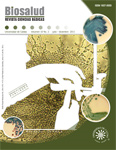Authors
Abstract
Objective: to evaluate the effect of learning methodology based on research projects, focused on the prevalence of learning approaches. Methods: the R-SPQ-2F (Revised Study Process Questionnaire in Two Factors) was administered at the end of the semester to 98 medical students enrolled in a physiology course at Universidad de Boyacá after hiving implemented supervised research projects during the academic period. Approaches, motives and learning strategies for each student were determined and the information was correlated with the information of grades given in a numerical scale at the end of the course. Results: most students exhibited a deep learning approach (86.6 %) predominantly in low intensity (54 %). A correlation was found between learning approach and academic performance. Conclusions: the implementation of supervised research projects was helpful in generating a deep approach to learning in this population, which was reflected on academic performance reported in numerical scale at the end of the course. However, the intensity of the approach is still low and it requires more work in the Basic Sciences Department at the curriculum development level.
References
Marlon F, Saljo R. On qualitative differences in learning-I: Outcome and process. British Journal of Educational Psychology 1976; 46:4-11.
Marlon F, Saljo R. On qualitative differences in learning-I: Outcome as a function of the learner’s conception of the task. British Journal of Educational Psychology 1976; 46:115-127.
Universidad de Boyacá. Facultad de Ciencias de la Salud. Informe Académico General Cohorte 2010. Tunja.
Marlon F, Hounsell D, Entwistle N. The experience of learning: implications for teaching and studying in higher education. Edinburgh: Scottish Academic Press; 1997.
Shuell TJ. Cognitive conceptions of learning. Review of Educational Research 1986; 56:411-436.
Ramsden P. Learning to teach in higher education. London: Routledge; 1992.
Ramsden P. The context of learning. In F Marton, D Hounsell, and N Entwistle (eds). The experience of learning. Edinburgh: Scottish Academic Press; 1984.
Biggs JB. Teaching for quality learning at university. Buckingham: Open University Press/Society for Research into Higher Education; 2003.
Biggs JB, Kember D, Leung DY. The revised two-factor study process questionnaire: R-SPQ-2F. British Journal of Educational Psychology 2001; 71:133-149.
Biggs JB. The study process questionnaire (SPQ): manual. Hawthorne: Vic. Australian Council for Educational Research; 1987.
Biggs JB. Dimensions of study behaviour: Another look at ATI. British Journal of Educational Psychology 1986; 46:68-80.
Kember D, Leung DY. The dimensionality of approaches to learning: an investigation with confirmatory factor analysis on the structure of the SPQ and LPQ. British Journal of Educational Psychology 1998; 68:395-407.
Kember D, Wong A, Leung DY. Reconsidering the dimensions of approaches to learning. British Journal of Educational Psychology 1999; 69:323-343.
Kember D, Charlesworth M, Davies H, McKay J, Scott V. Evaluating the effectiveness of educational innovations: using the Study Process Questionnaire to show that meaningful learning occurs. Studies in Educational Evaluation 1997; 23(2):141-157.
Kember D. Action learning and action research: improving the quality of teaching and learning. London: Kogan Page; 2000.
Biggs JB, Kirby J. Differentiation of learning processes within ability groups. Educational Psychology 1984; 4:21-39.

 PDF (Español)
PDF (Español)
 FLIP
FLIP














